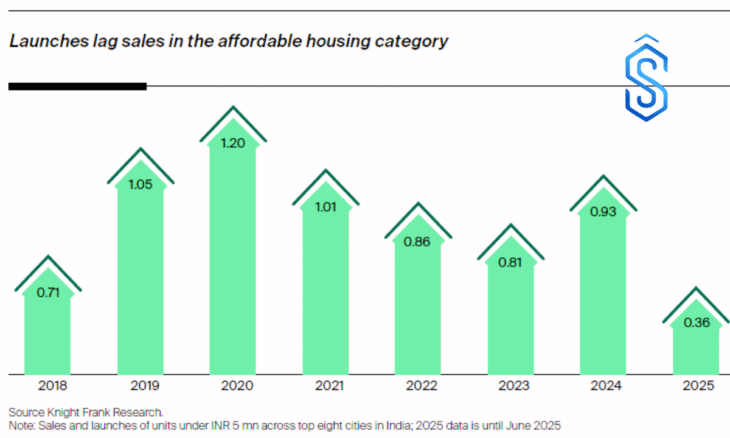Mumbai: The affordable housing gap in India has widened significantly, with new supply falling far short of demand across the country’s major urban centres.
According to Knight Frank India’s latest report, released in association with the National Real Estate Development Council (NAREDCO), the supply-to-demand ratio in the affordable housing segment has plummeted to 0.36 in the first half of 2025, down from 1.05 in 2019.
Affordable Housing Gap Hits Critical Levels
The report, titled Affordable Housing: Tackling Urban Housing Deficit Through Supply-Side Reforms, warns that India’s affordable housing shortage—currently at 9.4 million units—could surge to 30 million units by 2030. With new launches collapsing to a third of sales, the imbalance threatens to undermine affordability and restrict buyer choice.
Also Read: GST Reforms Vs 50 Per Cent Tariffs: How Will the Housing Sector Fare?
Demand-Side Policies vs. Supply Constraints
Over the past decade, schemes such as the Pradhan Mantri Awas Yojana (PMAY) and Affordable Rental Housing Complexes (ARHCs) have helped boost affordability and homeownership among economically weaker sections and low-income households.
However, the report highlights that the core issue lies on the supply side. Developers face significant barriers including escalating land costs, limited access to construction finance, delays in regulatory approvals, and weak infrastructure in peripheral locations.
Industry Leaders Call for Supply-Side Reforms
Shishir Baijal, Chairman and Managing Director of Knight Frank India, emphasized, “Affordable housing is not only a social priority but also an economic necessity. The imbalance between supply and demand poses serious risks to inclusive growth. Encouraging private sector participation with innovative financing, faster approvals, and land availability is critical to bridging the affordable housing gap.”
Also Read: Omicron Business Landmarks Kharadi NX: New 26-Floor Grade A Office Development in Pune
Investment Remains Weak in Affordable Housing
Between 2011 and 2024, private equity inflows into affordable housing totaled just USD 1.9 billion, accounting for 7.8% of residential sector investments. Foreign capital comprised only 10.2% of inflows between 2019 and 2024. Experts warn that without structural reforms, private investment will remain constrained, further widening the affordable housing gap.
Path Forward: Unlocking Supply for Inclusive Growth
The report recommends key interventions including unlocking PSU land for housing, rationalising FSI norms, offering subsidised construction finance, and creating public-private partnerships. These reforms, it argues, can attract greater private participation, ensure adequate supply, and support India’s long-term vision of inclusive and sustainable urban growth.










